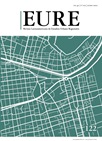Geospatial analysis of presidential elections in Mexico, 2012
DOI:
https://doi.org/10.4067/S0250-71612015000100009Keywords:
spatial concentration, socio-territorial transformations, spatial distribution.Abstract
The importance of electoral geography, as a branch of political geography, stems from the opportunity it provides to explain electoral preferences in terms of territories.
Electoral research with a geographic focus assumes that individual political preferencesÍ concentrated in a particular location are not unrelated, but are in fact correlated. ThisÍ article discusses the existence of a geography of the presidential vote in the 2012 elections inÍ Mexico. After reviewing the literature and arguing in favor of the use of exploratory spatialÍ data analysis, the article proposes the use of spatial autocorrelation indices for the study ofÍ presidential elections. The proposed scheme, while offering a glimpse of territorial politicalÍ polarization in Mexico, allows for a valuation of the explanatory power of geographic spaceÍ in electoral processes.
Downloads
Published
How to Cite
Issue
Section
License
Copyright (c) 2015 Revista EURE - Revista de Estudios Urbano Regionales

This work is licensed under a Creative Commons Attribution 4.0 International License.
Al momento de aceptar la publicación de sus artículos, los autores deberán formalizar la cesión de derechos de autor a EURE, según las condiciones establecidas por la Revista.
Ésta establece que el autor autoriza a EURE de manera gratuita, exclusiva e ilimitada a reproducir, editar, publicar, distribuir, publicitar, comercializar y traducir el artículo, a cualquier soporte conocido o por conocer y desarrollar.
Del mismo modo, los autores aseguran que el artículo propuesto es original, no publicado y no propuesto para tal fin a otro medio de difusión.


